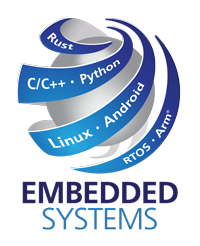Introduction
Provide background information about the training and the Zephyr project.
Welcome • Course Objectives • Background on Zephyr • Getting started with Zephyr • Development environments
Zephyr for Embedded Products
Discuss what makes Zephyr a good fit for embedded products.
Why use Zephyr? • Hardware Support • Ecosystem Overview • Licensing • Product Examples
Developing with Zephyr
Discuss practical considerations when developing embedded products with Zephyr.
Zephyr Paradigm Shift • Product Considerations • Release Lifecycle • Security • Software update
Zephyr Ecosystem Overview
Give an overview of the Zephyr Ecosystem.
Architecture • Kernel and OS services • Connectivity Stacks • Proprietary Extensions
Zephyr Build System
Understand the Zephyr Build System.
West Workspace and Manifest • west tool • Managing Workspace • Building and Flashing applications • Using emulators • Zephyr Build Systems • YAML files
Zephyr Kernel
Understand how the Zephyr kernel works and how to configure it for a product.
Kernel services overview • Threads and Scheduling • Preemptible and Cooperative threads • Threads APIs • SMP and CPU idling • Kernel configuration • Product development Tips
Devicetree and Hardware Abstraction Layer (HAL)
Get introduced to devicetree.
Why devicetree? • Hardware Abstraction Layer • Devicetree and Zephyr • Blinky walkthrough
Kconfig
Learn about Kconfig and how to configure Zephyr for your application
What is Kconfig? • Compile time modularity • Using Interactive Configuration • Configuring Application • prj.conf and overlays • Product development Tips
Kconfig Troubleshooting
Learn how to resolve the most common issues related to Kconfig.
prj.conf not found • Configuration is not applied • Unmet dependencies • Build errors during compilations.
Zephyr Debugging Part 1
Learn how shells, logging and tracing help with application debugging during the development phase.
Shells • Configuring and Using Shells • Logging Subsystem • Configuring and Using Logging • Tracing Subsystem • Configuring and Using Tracing
Zephyr Debugging Part 2
Learn how to debug Zephyr applications.
Cross-debugging • GDB and VScode • Debugging Fatal Error • Core Dump • Stack Overflow Detection and Debugging • Tips for Device in the Fields.
Logging
Learn how to leverage the logging APIs for your applications.
Logging subsystem • printk and printf • Log Module • Log APIs • Custom Application Kconfig • More on Logging
Hardware Integration
Discuss how to integrate peripherals in Zephyr.
Hardware Integration procedure • Devicetree bindings • Devicetree overlays • Using drivers in application • Product Development Tips
Working with Devicetrees
Introduce the syntax and usage of devicetrees to gain a deeper understanding of how devicetree is used in Zephyr.
Devicetree source and other files • Devicetree syntax • Devicetree node and properties • important nodes (addressable resources, interrupts…) • Devicetree APIs • Use in Zephyr applications.
Devicetree Troubleshooting
Learn how to resolve the most common issues related to devicetrees.
Gosh, I got hundredths of cryptic compilation errors! • Common devicetree issues • How to resolve • Practical tips and tricks to ease troubleshooting.
ZBus
Discuss Zbus, a lightweight and flexible software bus for applications.
Why ZBus? ZBus key concepts • Channels, Listeners, (message) Subscribers • Zbus APIs • Virtual Distributed Events Dispatcher • Higher Locker Priority Protocol • Going further
Timers and Interrupts
Learn about timers and interrupts.
Measuring Time • Working with Timers • Interrupt Service Routine • Top/Bottom halves • System and Custom Workqueue • Working with Workqueues • Using interrupts.
Device Drivers
Discuss the steps required to develop and integrate a custom device driver in Zephyr.
Driver Development recipe • Devicetree bindings and Kconfig • Device Driver Model • Driver Implementation • Driver Registration • System Initialization • Using the Drivers • Product development tips
Working without Hardware
Learn about QEMU and native simulator and discuss how these technologies can be used during product development.
QEMU • QEMU Use Cases • native_sim • native_sim Use Cases • Emulated Devices • Testing drivers • Creating a Device Driver Emulator.
Ztest and Twister
Introduce Zephyr’s test framework, Ztest, and the test runner tool twister.
Twister • Using twister • Test reports and scenarios • Ztest • Writing Tests with Ztest • Hardware In the Loop (HIL) testing • Going Further
Quality Assurance
Discuss common tools available with Zephyr to assess and improve the quality of your product.
Footprint and Memory Usage • Static Code Analysis • Code Coverage • Software Bill of Materials (SBOM)
Writing Zephyr Application
Discuss a typical project structure for applications.
How to integrate proprietary code • Zephyr module • Creating and Using a Zephyr Module • Creating a Custom Workspace for your product • Zephyr Example Application.
Flying your Kite
Wrap-up, free Q&A sessions, further Zephyr and Doulos Resources.
Optional Topics:
The following sections are available in the Zephyr Essentials Manual, but are not normally covered in our public offering. These topics can be booked for team-based training.
Managing Memory
Discuss the aspects related to memory management in Zephyr.
Code Relocation • System Heap • Synchronized Heaps • Low-level heap allocators • Memory Slabs • Memory Blocks
Synchronization
Learn about the synchronization services and APIs provided by Zephyr and how they differ from other Operating Systems.
Semaphores • Mutex • Condvars • Events • Spinlock • When to use?
Passing Data
Introduce the data passing primitives and APIs offered by the Zephyr Kernel.
Kernel FIFO, LIFO and Queues • Kernel messages • Kernel Pipe




